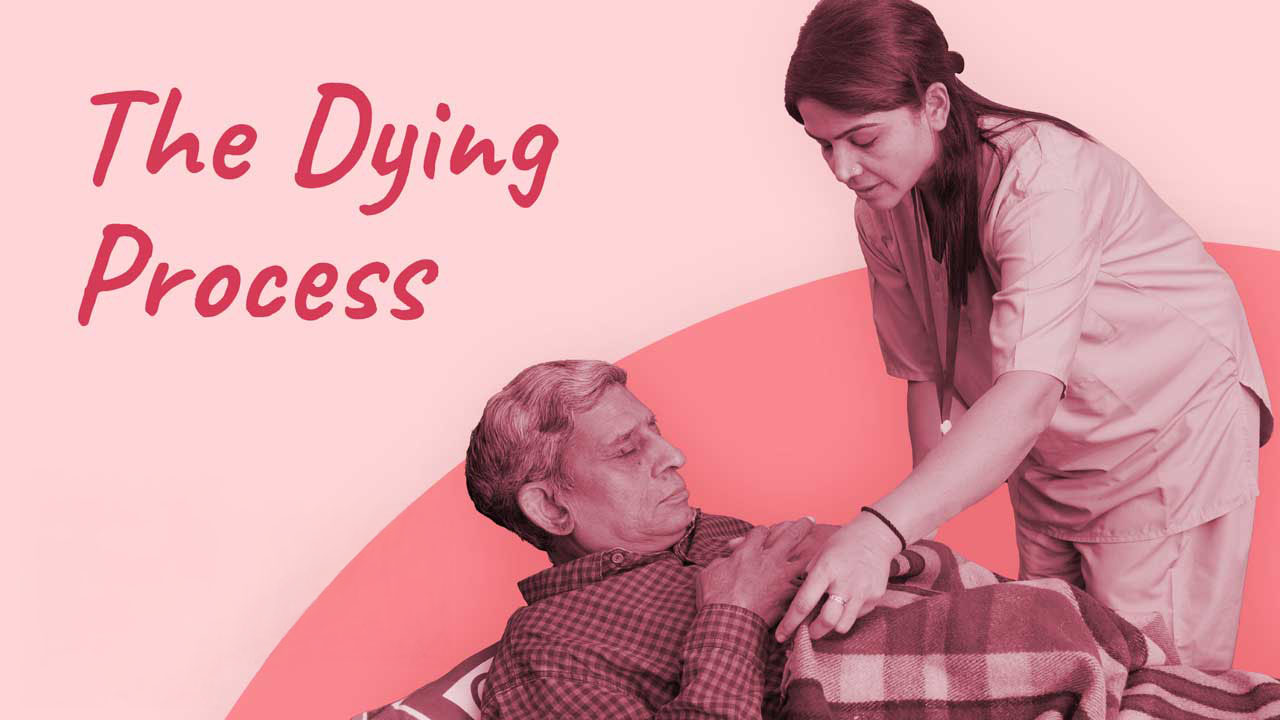Death is a normal part of the life cycle. As a healthcare worker or professional, it should be viewed as an honour and privilege to be part of the care provided to a person who is dying, as well as their loved ones.
When caring for someone at the end of their life, it is important to know what to expect during death.
In this article, we will examine the physical and emotional changes that occur during the dying process and provide tips on how to care for a dying patient with dignity, respect and compassion.
The Role of Healthcare Professionals in Death
Patients and families value shared decision-making, expert care, respect and compassion during the end-of-life period (CareSearch 2021).
Identified barriers to providing appropriate end-of-life care include:
- Being unable to recognise the signs of dying
- Inability to manage end-of-life symptoms
- Lack of ability to communicate with patients and loved ones about the dying process
(CareSearch 2021)
Recognising signs that a patient is nearing death is an essential part of providing high-quality care (CareSearch 2021).
Appropriate recognition ensures that trained health professionals can work collaboratively with all members of the care team to confidently discontinue any treatments that may be burdensome in the last days of life, as well as provide care that optimises the patient’s wellbeing and respects their values and preferences (Queensland Health 2019).
According to Ellershaw and Lakhani (cited in Queensland Health 2019), there are 10 key elements for best care of the dying person:
- Recognition that the patient’s death is nearing (and appropriate documentation of this).
- Communication with the patient (if this is deemed appropriate) and their relatives, carers or advocates to inform them that death is nearing.
- Discussion about the patient’s preferences, feelings, faith, beliefs and values.
- Anticipatory prescription of medicines to alleviate pain, excessive respiratory secretions, agitation, nausea, vomiting and shortness of breath.
- Review of all clinical interventions to ensure they are in the patient’s best interests.
- Review of the patient’s hydration needs (including the commencement, continuation or cessation of artificial hydration).
- Review of the patient’s nutrition needs (including the commencement, continuation or cessation of artificial nutrition).
- Discussion of the care plan with the patient (if this is deemed appropriate) and their relatives, carers or advocates.
- Assessment of the patient every four hours.
- Dignified and respectful care immediately after death.

The Dying Process Under the Strengthened Aged Care Quality Standards
Standard 5: Clinical Care - Outcome 5.7: Palliative and End-of-life care (Action 5.7.3) under the strengthened Aged Care Quality Standards requires aged care organisations to provide an older person’s loved ones with information about the dying process, loss and bereavement as part of palliative care (ACQSC 2024).
The Signs of Dying
It is important to understand the physiological process of dying. Generally, the patient’s body systems will start to slow down. The heart will beat more slowly, reducing cardiac output and circulatory perfusion to the organs and tissues in the body. As a result, the brain and organs will receive less blood and oxygen than required (Healthdirect 2023).
The following changes are likely to occur during the dying process. However, it is important to remember that death is different for every person, and these signs may or may not occur, depending on the individual (Palliative Care Australia 2020; End-of-Life Care Program 2023).
You may notice these changes weeks, days or even hours before death and there is no specific order in which they will occur (Palliative Care Australia 2020; Healthdirect 2023). Therefore, it is important to recognise any signs of discomfort and ensure symptoms are attended to immediately.
- The patient may feel tired, causing them to sleep more often or for longer periods of time.
- The digestive system will slow, causing reduced appetite and thirst or a desire to eat different foods.
- The patient may have difficulty regenerating skin cells, causing the skin to become thinner.
- The patient may experience weight loss.
- Breathing may become irregular, shallow or noisy due to reduced blood flow and accumulating waste products. This may also cause coughing.
- The skin may become pale, grey, dark or mottled due to reduced blood circulation.
- The patient may become confused or sleepy due to reduced oxygen in the brain. They may experience hallucinations, become disoriented with time, people or place, or lose consciousness.
- The patient may withdraw socially due to a lack of energy to stay alert and communicate.
- The patient’s senses may decline. Hearing is the last sense to be lost, so the patient might still be able to hear people speaking to them even if they are unconscious.
- The patient’s body temperature may fluctuate due to reduced blood flow.
- The patient may become incontinent.
- Saliva and mucus may gather in the patient’s throat due to the slowing of coughing and swallowing (terminal respiratory secretions). This may cause bubbling noises.
- The patient may become restless due to reduced blood flow to the brain and other physiological changes.
(Healthdirect 2023; Palliative Care Victoria 2018)
Maintain compassion and open communication at all times with patients and their loved ones. Creating a safe and compassionate environment is fundamental to all involved in the care being provided.
Managing Symptoms During the Dying Process
| Symptom | Management |
|---|---|
| Social withdrawal |
|
| Confusion |
|
| Reduced eyesight |
|
| Pain |
|
| Nausea and vomiting |
|
| Loss of appetite and thirst |
|
| General hygiene |
|
| Oral hygiene |
|
| Fatigue |
|
| Fluctuating body temperature |
|
| Incontinence |
|
| Retention |
|
| Saliva and mucus |
|
| Irregular breathing or shortness of breath |
|
| Fever |
|
| Restlessness |
|
| Anxiety and distress |
|
(Palliative Care Victoria 2018; End-of-Life Care Program 2023; Queensland Health 2019)
Communicating with the Patient’s Family and Friends
The following practical tips may help you to support and communicate with the patient’s loved ones during the dying process:
- Ensuring loved ones understand that death is imminent
- Recognising any spiritual, cultural or practical needs
- Recognising and responding to loved ones’ emotional needs
- Providing relevant information and ensuring loved ones know what to expect
- Explaining the rationale for discontinuing treatments (if this is indicated) and how you will maintain the patient’s comfort
- Involving loved ones in care
- Establishing a roster to ensure the patient is not left alone (if this is what loved ones request)
- Allowing loved ones to take adequate time to say goodbye
- Allowing loved ones to have time alone with the patient
- Encouraging loved ones to get adequate rest, take breaks, eat and drink
(Queensland Health 2019)
Providing Emotional Comfort During Death

The patient may be comforted by:
- The presence of loved ones or pets
- Being spoken to in a calm, reassuring way (even if they are unconscious)
- Having their hand held
- Familiar music
- Fresh air
- Spiritual rituals
- Complementary therapies (e.g. aromatherapy)
- Relocation to a private room or area
- Comfortable lighting and room temperature
- Familiar objects or photos
- Access to a call bell (encourage family and friends to use this device as a form of communication)
(Palliative Care Victoria 2018; Queensland Health 2019)
Death
It is important to note that death is often peaceful for the patient. In most cases, the patient will be calm in the hours before death occurs (Healthdirect 2023).
As the patient’s body begins to ‘let go’ of life, they may fall in and out of consciousness and experience changes in colour, circulation or breathing pattern (Better Health Channel 2018). This can often be confronting for the patient’s loved ones, and they may seek reassurance and ask questions throughout the process. It's important you, as a healthcare professional, understand the process and are confident in providing information. If you are unsure, reach out to another colleague who can help explain what is happening.
Eventually, the patient will fall into complete unconsciousness. They will not be able to be woken, but may still be able to hear and maintain awareness of their surroundings (Better Health Channel 2018).
Within a few minutes of the patient's heart and breathing stopping, the patient’s brain will cease functioning, and their skin will cool (Healthdirect 2023).
The presence of loved ones can bring great comfort to a dying patient, even if the patient is not conscious (Better Health Channel 2018).
The patient will display the following signs once death has occurred:
- Absence of palpable cardioid pulse
- Absence of heart sounds for 30 seconds
- Absence of breath sounds for 30 seconds
- Pupils dilated and fixed on one spot
- Lack of response to centralised stimuli
- Lack of motor response or facial grimace response to pain
(Queensland Health 2019)
You may also notice the following signs:
- Partially open eyelids
- Mouth falling open due to the relaxed jaw
- Pale and waxy skin
- Loss of bladder and bowel control
(Palliative Care Victoria 2018; End-of-Life Care Program 2023)
After death has occurred, loved ones may want to sit with the deceased patient for a period of time (Better Health Channel 2018).
There is no need to contact emergency services if the death is expected (End-of-Life Care Program 2023).
Always treat the deceased patient with dignity and respect.
Reflection Questions
- Can you recall a time when you were involved in caring for a person who was dying?
- What was the environment like? What could you hear and see?
- In what ways could you have improved your care of that patient?
Topics
Further your knowledge
 Free
Free Free
Free Free
Free

 Free
FreeReferences
- Aged Care Quality and Safety Commission 2024, Standard 5: Clinical Care, Australian Government, viewed 28 May 2024, https://www.health.gov.au/resources/publications/strengthened-aged-care-quality-standards-august-2025?language=en
- Better Health Channel 2018, At the End – Dying Explained, Victoria State Government, viewed 28 May 2024, https://www.betterhealth.vic.gov.au/health/servicesandsupport/At-the-end-dying-explained
- CareSearch 2021, Care of the Dying Person, CareSearch, viewed 28 May 2024, https://www.caresearch.com.au/caresearch/tabid/738/Default.aspx
- End-of-Life Care Program 2023, Understanding the Dying Process: An Information Booklet for Families, Government of Western Australia, viewed 28 May 2024, https://healthywa.wa.gov.au/Articles/U_Z/Understanding-the-dying-process
- Healthdirect 2023, The Physical Process of Dying, Australian Government, viewed 28 May 2024, https://www.healthdirect.gov.au/the-physical-process-of-dying
- Palliative Care Australia 2020, The Dying Process: Information for Carers, Palliative Care Australia, viewed 28 May 2024, https://palliativecare.org.au/wp-content/uploads/2019/04/PCA_The-Dying-Process.pdf
- Palliative Care Victoria 2018, The Process of Dying: What to Expect and How to Help, Palliative Care Victoria, viewed 28 May 2024, https://pallcarevic.asn.au/wp-content/uploads/2018/10/Process-of-Dying-PCV-2018.pdf
- Queensland Health 2019, Care Plan for the Dying Person: Health Professional Guidelines, Queensland Government, viewed 28 May 2024, https://www.health.qld.gov.au/__data/assets/pdf_file/0023/833315/cpdp-care-plan-hp-guidelines.pdf
 New
New 
